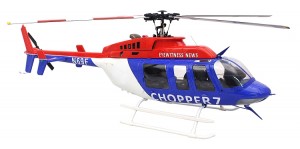My dreams of working in television were formed back in the “good old days” By the time I got into the business the good old days were starting to wane. By the time I got out, the industry was on the precipice of what is happening to it currently – a paradigm-shifting retrenchment. 
All the things we all worried about are happening right now, not the least of which is a massive bloodletting in the industry that is seeing staffs gutted as stations do more with less. Once you have a newsroom, adding newscasts doesn’t cost much when you’re not worried about some of the qualitative things we used to delude ourselves into worrying about.
With that said, one of the big cost centers the industry is targeting right now is helicopter time. It’s not an issue in small markets of course, but here in Seattle – all three of the OG affiliates are still flying choppers. I can’t help but wonder if thatís going to last much longer.
Chopper sharing agreements are already in place in larger markets like Dallas, Boston, Philadelphia and Chicago. Similar agreements are being hatched in New York and Los Angeles. While this current round of agreements involve Fox stations and a single OG, I don’t think market-wide sharing agreements are far off – especially in mid-sized markets like Seattle.
I worked for six years in the left (passenger) seat of a Jet Ranger II in Sacramento. We could not have done a credible job of covering that market without air support for reasons I won’t bore you with here. But a year after I left for Columbus, Ohio, the station lost the helicopter and got even more soundly spanked than usual by the competition.
Now though, the stakes are too high for a game of chicken. Seeing who will be the last man standing with a chopper, and a TV news operation for that matter, is too risky – so stations are starting to pool resources realizing that they’re not just trying to beat each other – they’re trying to save the market for TV news.
Frankly, a lot of the chopper shots we did could have been pooled. Three, three-man teams orbiting the same story never really made any sense. And for that matter, groups of cameras at court hearings, news conferences and other routine “news” events really don’t make much sense either. Let’s face it, most stations don’t have the human resources (and probably never did) to think that their staff is going to bring a unique perspective to a story. Please.
Truly creative presentation, exclusive reporting or meaningful investigative work in TV news was always scarce, and is soon to become rare – and this comes from a guy who loved it, and still does.
Is it worth sending a Greg Palmer (RIP), or a Bryan Johnson to a story with his own resources for a unique take? Heck yes. Is it justified in 90% of the other cases? Nope. Not in this environment. Just don’t have the ponies – which means, writers.
So look for not only pooled helicopters, but pooled on-the-ground news gathering too. The days of calling a news conference and having to set up a riser, mult-box and mic podium are probably on their way out. Heck, plan on shooting your own news conference and uploading it to a “news server” somewhere. Content sharing is coming on a much larger scale and in ways we can’t imagine yet.
So what’s my larger point? That station resources should be increasingly “spent” only on content that differentiates you from the competition – not only your news competition, but your programming competition too.
If that doesn’t exist – if something other than two people behind a desk reading the same stories the same way canít be invented – then these “bad old days” could last a long time.









